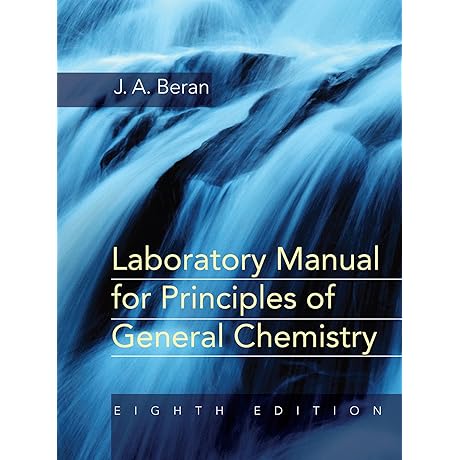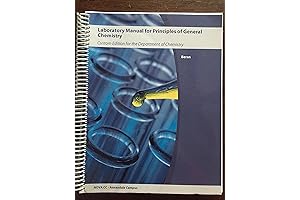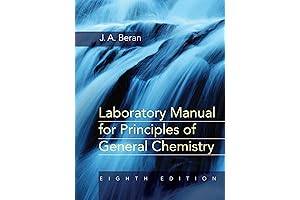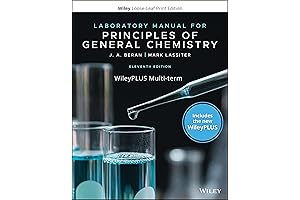· general chemistry · 11 min read
Discover the Top Picks: Laboratory Manuals for Principles of General Chemistry
Unveiling the best laboratory manuals for an in-depth understanding of Principles of General Chemistry. Explore our curated selection and choose the perfect guide for your academic journey.
Embark on an enlightening journey through the principles of general chemistry with our meticulously chosen laboratory manuals. Designed to complement your theoretical knowledge, these manuals offer hands-on experiments and engaging exercises to deepen your comprehension of chemical concepts. Whether you're a student, educator, or professional seeking to enhance your understanding, our top picks will empower you with the practical skills and insights you need to excel in the field of chemistry.
Overview

PROS
- Step-by-step procedures and clear instructions to enhance understanding
- Engaging experiments demonstrate the chemical principles discussed in theory
CONS
- May require additional resources for a more comprehensive understanding
- Experiment selection could be expanded to cover a wider range of concepts
This laboratory manual serves as an excellent companion to your general chemistry course, providing hands-on experience to solidify your theoretical knowledge. Its clear instructions and well-structured experiments guide you through the fundamental concepts of chemistry, ensuring a comprehensive understanding of its principles.
The manual effectively bridges the gap between theory and practice, transforming abstract concepts into tangible experiences. However, it may benefit from additional resources, such as videos or simulations, for a more comprehensive and interactive learning experience.

PROS
- Provides step-by-step guidance for a wide range of laboratory experiments in general chemistry.
- Includes clear and concise instructions, allowing students to understand experimental procedures effortlessly.
- Enhances understanding of chemical concepts through hands-on experimentation.
- Promotes critical thinking and problem-solving skills in a laboratory setting.
CONS
- May require additional resources for students who need a more in-depth theoretical background.
- Some experiments may require specialized equipment or chemicals that might not be readily available.
- May not be suitable for students with limited laboratory experience.
Beran's Laboratory Manual for Principles of General Chemistry is an invaluable resource for students seeking a comprehensive and practical guide to laboratory experiments in general chemistry. This 10th edition offers a wide range of experiments that are designed to reinforce the theoretical concepts presented in the Principles of General Chemistry course.
The manual's strength lies in its clear and concise instructions, which guide students through each experiment step-by-step. This user-friendly approach makes it easy for students to understand the experimental procedures and minimize errors. Additionally, the manual includes helpful diagrams and illustrations that further enhance understanding.
Furthermore, the experiments in this manual are designed to promote critical thinking and problem-solving skills. Students are encouraged to analyze data, draw conclusions, and troubleshoot any issues they may encounter during the experiments. This hands-on approach not only deepens their understanding of chemical concepts but also equips them with valuable laboratory skills that are essential for success in chemistry and related fields.

PROS
- Step-by-step instructions guide students through experiments safely and effectively.
- Clear explanations of chemical principles reinforce concepts learned in class.
CONS
- May not be suitable for advanced chemistry students.
- Some students may find the manual too basic.
Dive into the fascinating world of chemistry with the Laboratory Manual for Principles of General Chemistry. This comprehensive guide is meticulously crafted to provide a step-by-step exploration of fundamental chemical principles, empowering students to grasp abstract concepts through hands-on experimentation. Each experiment is meticulously designed to align with classroom instruction, fostering a deeper understanding of the subject matter.
The manual's strength lies in its clear and concise explanations, which effectively complement classroom learning. Students will appreciate the lucid breakdown of complex chemical concepts, making the learning process more accessible and engaging. Furthermore, the manual promotes scientific curiosity and critical thinking by encouraging students to analyze results, draw conclusions, and troubleshoot potential errors. It's an indispensable companion for students seeking a solid foundation in general chemistry, equipping them with the knowledge and skills to excel in their academic pursuits and beyond.

PROS
- Well-organized and structured for efficient learning.
- Includes clear instructions, diagrams, and safety protocols.
- Provides diverse experiments to enhance understanding of chemistry concepts.
CONS
- Not as extensive as some high-level chemistry lab manuals.
- May need additional resources for advanced experiments.
The Laboratory Manual for Principles of General Chemistry is an invaluable resource for students seeking a comprehensive and accessible guide to chemistry experiments. Its logical organization and step-by-step instructions provide a clear path for mastering experimental techniques. The abundance of diagrams and safety protocols ensures a safe and productive learning environment. Additionally, the variety of experiments offered explores a broad range of chemistry concepts, catering to diverse learning styles and interests. While its scope may not fully encompass advanced experiments, it serves as an excellent foundation for students just beginning their journey in chemistry.
This user-friendly lab manual is not only easy to follow but also engaging and informative. By incorporating personal anecdotes and real-world applications, the authors bring chemistry to life. The manual fosters an active learning experience, encouraging students to question, explore, and make meaningful connections between theoretical concepts and experimental findings. Its emphasis on critical thinking and problem-solving skills prepares students for success in more advanced chemistry courses and beyond.

PROS
- Offers a comprehensive and up-to-date guide to general chemistry laboratory experiments.
- Features clear and detailed instructions, ensuring successful execution of experiments.
- Provides pre-lab and post-lab questions to enhance understanding and reinforce concepts.
- Includes data analysis and interpretation exercises to develop critical thinking skills.
- Comes with a WileyPLUS access code for online resources and interactive simulations.
CONS
- May be too advanced for students with limited chemistry knowledge.
- The loose-leaf format may not be durable for extensive use.
The Laboratory Manual for Principles of General Chemistry, 11th Edition, bundled with WileyPLUS, is an essential resource for students seeking a thorough and engaging laboratory experience in general chemistry. This manual provides a comprehensive set of experiments that cover the fundamental principles of chemistry, from stoichiometry to thermodynamics. Each experiment is meticulously designed to guide students through the scientific method, fostering their understanding of chemical concepts and experimental techniques.
The manual's clear and step-by-step instructions, coupled with pre-lab and post-lab questions, ensure that students are well-prepared for each experiment and can effectively analyze and interpret their results. The inclusion of data analysis and interpretation exercises challenges students to think critically about their findings and develop essential problem-solving skills necessary for success in chemistry. Additionally, the WileyPLUS access code provides access to a wealth of interactive simulations and online resources, enhancing the learning experience and reinforcing key concepts.

PROS
- Step-by-step instructions for a wide range of chemistry experiments.
- Clear and concise explanations of chemical principles and concepts.
- Helpful diagrams and illustrations to aid understanding.
CONS
- Some experiments may require specialized equipment.
- Answers to practice questions are not included.
The Laboratory Manual for Principles of General Chemistry is an essential resource for students taking a general chemistry course. It provides step-by-step instructions for a wide range of chemistry experiments, from basic titrations to more complex spectrophotometry experiments. The manual also includes clear and concise explanations of chemical principles and concepts, as well as helpful diagrams and illustrations to aid understanding. Overall, this laboratory manual is a valuable tool for students learning general chemistry.
One potential drawback of the manual is that some experiments may require specialized equipment, which may not be available to all students. Additionally, the manual does not include answers to practice questions, which could be helpful for students in self-study or review. However, these minor drawbacks do not detract from the overall value of the manual as a comprehensive guide to chemistry lab experiments.

PROS
- Offers a comprehensive and hands-on approach to understanding general chemistry principles.
- Includes engaging experiments, simulations, and online resources to enhance learning.
- Provides clear and concise explanations to facilitate a deep understanding of chemical concepts.
- Aligned with the latest AP Chemistry curriculum to ensure relevance and rigor.
- Comes with WileyPLUS access for interactive learning and practice
CONS
- May require additional resources for a more in-depth understanding of certain topics.
- Some students may find the level of detail overwhelming.
Laboratory Manual for Principles of General Chemistry, 11e WileyPLUS Card with Loose-leaf Set is an invaluable resource for students and educators seeking a comprehensive laboratory experience in general chemistry. This manual provides a rich learning environment with its engaging experiments, simulations, and online resources. The clear and concise explanations guide students through complex chemical concepts, while the alignment with the AP Chemistry curriculum ensures relevance and rigor. The included WileyPLUS access enhances the learning experience with interactive learning modules and practice exercises.
The manual covers a wide range of topics in general chemistry, from atomic structure to thermodynamics. Each experiment includes detailed instructions, safety protocols, and data analysis exercises. The simulations and online resources provide additional support for students to visualize complex concepts and engage in virtual experiments. The hands-on approach this manual offers fosters a deeper understanding of chemical principles and prepares students for advanced studies in chemistry and related fields.

PROS
- Comprehensive coverage of key principles of general chemistry
- Step-by-step guidance through essential laboratory exercises
CONS
- May require additional resources for more advanced topics
- Assumes a basic understanding of chemistry
Immerse yourself in the fundamental principles of chemistry with our meticulously crafted laboratory manual, 'Chemical Principles in the Laboratory.' Designed for students embarking on their voyage into the world of chemistry, this guidebook serves as your trusted companion, providing step-by-step navigation through crucial laboratory exercises. Our team of experienced educators has curated this manual to ensure that every experiment is a building block towards solidifying your understanding of core chemical concepts.
With its comprehensive coverage of key principles, this laboratory manual empowers you to unravel the mysteries of atomic structure, chemical bonding, and equilibrium. Each experiment is thoughtfully structured to reinforce theoretical concepts and cultivate your practical skills. You'll delve into the intricacies of titrations, spectroscopy, and electrochemistry, gaining hands-on experience that will ignite your passion for chemistry.
Our comprehensive collection of laboratory manuals covers a wide range of topics essential for mastering the principles of general chemistry. From fundamental concepts to advanced applications, these manuals provide a structured and interactive learning experience. With clear instructions, detailed explanations, and thought-provoking questions, you'll gain a solid foundation in topics such as stoichiometry, thermodynamics, kinetics, equilibrium, and electrochemistry. Whether you're looking to reinforce your classroom learning or delve deeper into the subject, our top picks will guide you towards a profound understanding of general chemistry.
Frequently Asked Questions
What are the key benefits of using a laboratory manual for Principles of General Chemistry?
Laboratory manuals provide hands-on experiments and exercises that complement theoretical knowledge, enhance understanding of chemical concepts, and develop practical skills essential for success in chemistry.
How can I choose the best laboratory manual for my needs?
Consider your level of expertise, the specific topics you want to cover, and the learning style that suits you best. Our curated selection offers a range of options to cater to diverse needs.
What are some of the essential topics covered in these laboratory manuals?
These manuals cover fundamental concepts such as stoichiometry, thermodynamics, kinetics, equilibrium, and electrochemistry, providing a comprehensive foundation in general chemistry.
How do these laboratory manuals enhance the learning experience?
With clear instructions, detailed explanations, and thought-provoking questions, these manuals offer an interactive learning experience that reinforces classroom learning and promotes a deeper understanding of the subject.
Who can benefit from using these laboratory manuals?
Students, educators, and professionals seeking to enhance their knowledge and practical skills in the field of chemistry can all benefit from using these laboratory manuals.











